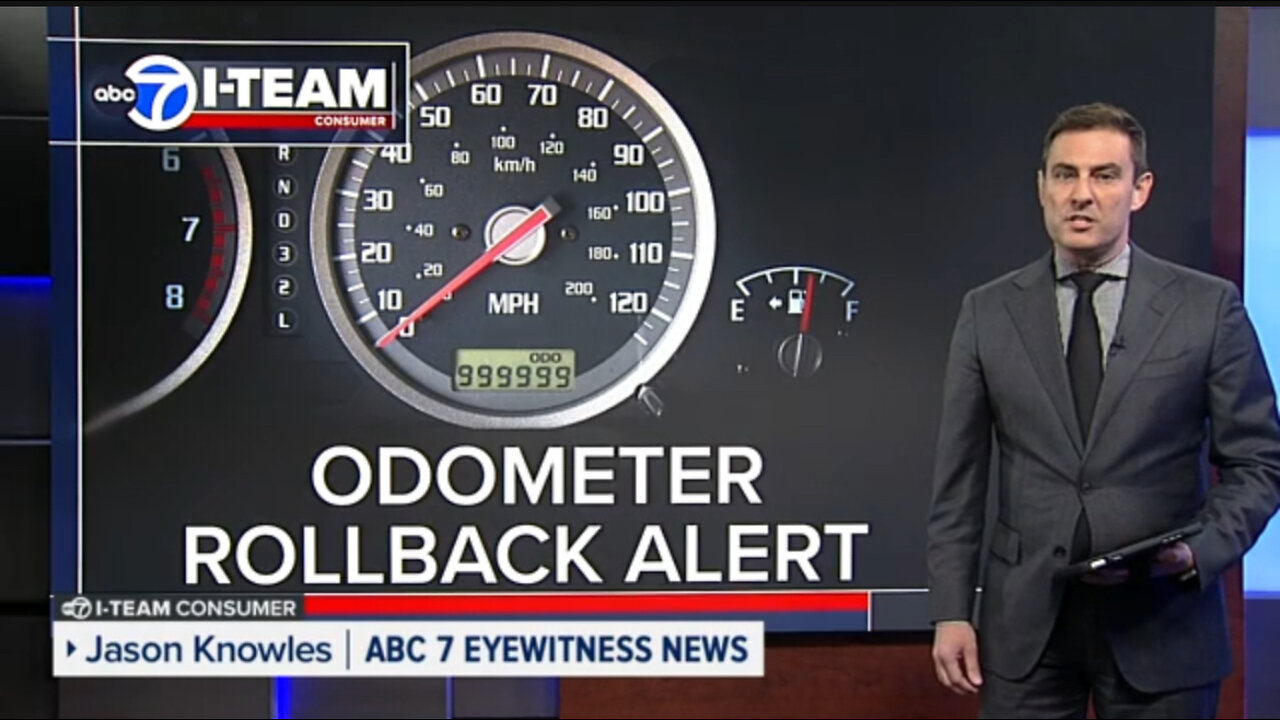Premium Only Content

The Shocking Rise of Odometer Fraud: How Scammers Use Tech to Roll Back Miles
When buying a used car, mileage is often one of the most critical factors influencing a buyer’s decision. But what if that odometer reading isn’t telling the truth? A recent demonstration reveals how scammers are leveraging technology to roll back vehicle mileage, deceiving buyers and inflating prices.
A Simple Hack with Alarming Consequences
In a chilling demonstration, Josh Engel, president of an electronic car repair company, showed how easily scammers can manipulate a vehicle’s odometer. Using a device designed for legitimate purposes—like correcting mileage on salvaged vehicles—he reduced the mileage on a truck from 310,000 miles to less than 100,000 in mere seconds.
“You’re kind of erasing what information is there before,” Engel explained, emphasizing how little trace this fraud can leave behind.
These tools, readily available online, are supposed to be restricted to professional mechanics but are increasingly falling into the hands of scammers.
A Growing Epidemic
According to Carfax, over 2 million vehicles on U.S. roads in 2024 may have had their odometers rolled back—a staggering 18% increase since 2021. Illinois ranks fifth in the nation for odometer fraud, with Chicago alone placing sixth among metropolitan areas.
The Hidden Costs of Fraud
Odometer fraud doesn’t just inflate vehicle prices; it can have dire consequences for buyers:
• Overpaying for a Vehicle: A car with lower mileage commands a higher price. Buyers unwittingly pay thousands more for vehicles falsely marketed as lightly used.
• Unexpected Repairs: High-mileage vehicles are more likely to need costly repairs. Fraudulently reduced mileage can mask wear and tear, leaving buyers with unexpected bills.
• Safety Risks: Misleading mileage can hide a car’s true condition, potentially putting drivers and passengers at risk.
How to Protect Yourself
Before purchasing a used car, buyers can take several steps to guard against odometer fraud:
1. Check the Vehicle History Report
Services like Carfax and AutoCheck provide detailed histories of a vehicle, including mileage records. Enter the Vehicle Identification Number (VIN) to uncover potential red flags.
2. Request Maintenance Records
Consistent maintenance logs often include mileage, helping to verify a vehicle’s true usage.
3. Get an Independent Inspection
Have a trusted mechanic inspect the car. They can often spot signs of tampering or unusual wear that doesn’t match the listed mileage.
4. Look for Seller Transparency
Reputable dealers and sellers should willingly provide vehicle history reports and cover the cost of inspections. Be cautious of anyone reluctant to share this information.
5. Examine Physical Clues
Check for inconsistencies between the odometer reading and the car’s condition:
• Worn pedals or steering wheel.
• Aging seats or interior features.
• Tires with excessive wear inconsistent with low mileage.
What to Do If You’re a Victim
If you suspect you’ve purchased a car with tampered mileage:
1. Report It: Notify your local Department of Motor Vehicles (DMV) or Secretary of State’s office.
2. Seek Legal Assistance: You may be entitled to compensation under federal odometer fraud laws.
3. Contact Authorities: In many cases, odometer fraud is a criminal offense. Filing a report can help build a case against fraudulent sellers.
The Fight Against Odometer Fraud
With odometer fraud on the rise, regulators and consumer advocates are pushing for stronger measures to combat this deceptive practice. Engel’s demonstration serves as a wake-up call, highlighting how easily criminals can exploit technology to defraud unsuspecting buyers.
“It’s alarming how simple this process is,” Engel noted. “Consumers must stay vigilant and do their homework.”
For buyers in cities like Chicago, where odometer fraud is especially prevalent, due diligence is essential. As used car purchases often come with an “as-is” clause, ensuring transparency before signing the deal can save money—and prevent future headaches.
A Final Word of Caution
As technology advances, so do the tactics of fraudsters. Whether you’re a seasoned car buyer or purchasing your first used vehicle, taking proactive steps to verify mileage and vehicle history is more important than ever. Remember: A little homework now can save you thousands later.
-
 6:58
6:58
FragmentsOfTruth
1 day agoThe Great Awakening: A New Era of Light, Truth, and Restoration
1122 -
 UPCOMING
UPCOMING
VOPUSARADIO
8 hours agoPOLITI-SHOCK! "THE TIDE IS TURNING"! 3 SPECIAL GUESTS JOINING US TONIGHT!
56 -
 52:47
52:47
Kimberly Guilfoyle
5 hours agoDismantling DEI Once and For All, Live with Tyler O’Neil & Eric Deters | Ep.190
66.3K27 -
 1:34:59
1:34:59
Redacted News
5 hours agoBREAKING! TRUMP SIGNS ORDER TO RELEASE JFK FILES, CIA IS FURIOUS | REDACTED NEWS
176K299 -
 1:36:09
1:36:09
Benny Johnson
6 hours ago🚨WATCH: President Trump Declassifies JFK, RFK, MLK Files LIVE Right Now in Oval Office, History Now
135K239 -
 LIVE
LIVE
Common Threads
4 hours agoLIVE DEBATE: Will Democrats Roll Over or Fight Back?
150 watching -
 54:47
54:47
LFA TV
9 hours agoDonald Trump Sets Israel Up for Failure | TRUMPET DAILY 1.23.25 7pm
17K15 -
 1:34:21
1:34:21
Sarah Westall
2 hours agoPsychological Warfare, Modern Weapons of War, Panama Canal, Special Ops & more w/ Michael Yon
31.4K6 -
 46:56
46:56
Chrissy Clark
3 hours agoTrump Responds To Woke Bishop, Cardi B’s TikTok FAIL, & MORE I Underreported Stories
18.5K2 -
 1:01:16
1:01:16
theDaily302
12 hours agoThe Daily 302 - Colonel Roxane Towner Watkins
12.6K